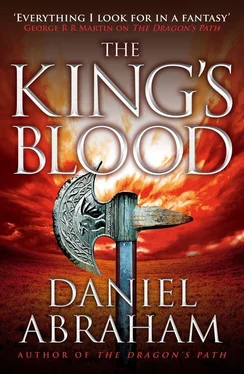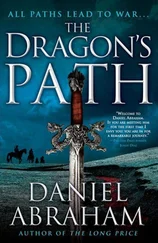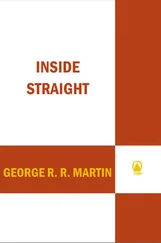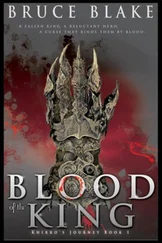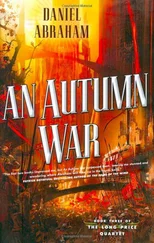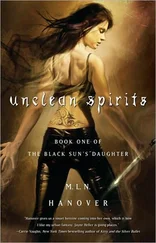Daniel Abraham - The King's Blood
Здесь есть возможность читать онлайн «Daniel Abraham - The King's Blood» весь текст электронной книги совершенно бесплатно (целиком полную версию без сокращений). В некоторых случаях можно слушать аудио, скачать через торрент в формате fb2 и присутствует краткое содержание. Жанр: Фэнтези, на английском языке. Описание произведения, (предисловие) а так же отзывы посетителей доступны на портале библиотеки ЛибКат.
- Название:The King's Blood
- Автор:
- Жанр:
- Год:неизвестен
- ISBN:нет данных
- Рейтинг книги:3 / 5. Голосов: 1
-
Избранное:Добавить в избранное
- Отзывы:
-
Ваша оценка:
- 60
- 1
- 2
- 3
- 4
- 5
The King's Blood: краткое содержание, описание и аннотация
Предлагаем к чтению аннотацию, описание, краткое содержание или предисловие (зависит от того, что написал сам автор книги «The King's Blood»). Если вы не нашли необходимую информацию о книге — напишите в комментариях, мы постараемся отыскать её.
The high and powerful will fall, the despised and broken shall rise up and everything will be remade.
And an old, broken-hearted warrior and an apostate priest will begin a terrible journey with an impossible goal: destroy a Goddess before she eats the world.
The King's Blood — читать онлайн бесплатно полную книгу (весь текст) целиком
Ниже представлен текст книги, разбитый по страницам. Система сохранения места последней прочитанной страницы, позволяет с удобством читать онлайн бесплатно книгу «The King's Blood», без необходимости каждый раз заново искать на чём Вы остановились. Поставьте закладку, и сможете в любой момент перейти на страницу, на которой закончили чтение.
Интервал:
Закладка:
“No!” one of the other women said. “But that was all he had that made him at all attractive.”
“I can’t believe he’s still being seen with Alan Klin,” said another. “You’d think those two would put a bit more air between them after being lumped in with Feldin Maas.”
Clara sat back a degree in her chair, listening, laughing, sharing bits of barely sweetened cake and biting lemon tea. For an hour, they spoke of everything and nothing, the words pouring out of them all in a flood. Even Clara with her love of winter also saw the joy of talking in company after so many weeks alone. This was how the court wove itself into a single tapestry—small gossip and news, speculations and enquiries, fashions and traditions. Her husband and sons would have made no more sense of it than of birdsong, but for Clara it was all as legible as a book.
She took her leave early enough that she could walk back to her own mansion. Camnipol in spring could be a shockingly beautiful place. In her memory, the city was all of black and gold, and so the real stone and ivy always surprised her. Yes, the streets were cobbled dark and soot marked many walls. Yes, there were great burnished archways throughout the city, tributes to the victories of great generals, some of them generations dead. But there was also a common with a double line of burgundy-leaved trees, a Cinnae boy, pale and thin and ghostly, dancing on the street corner for coins while his mother sawed away on an ancient violin. Clara paused for a moment in an open square at the edge of the Division to watch a theater company declaim on their small, sad wagon-mounted stage. The actors playing tragic young lovers were decent enough, but the grandeur of the view behind them kept distracting her.
The grandeur of the view, or else some part of her didn’t want to dwell on young love and tragedy. Not today, at least.
At her house, Andrash rol Estalan, their Tralgu door slave, stood at the end of his silver chain. His ears were at high alert. His father had been one of her own father’s huntsmen, and she had a fond spot for him.
“Your son is with Lord Skestinin’s son and daughter, my lady,” he said. “They are in the west garden.”
“Thank you, Andrash. And is my husband at home?”
“No, my lady. I believe he has gone to the Great Bear with Lord Daskellin.”
“Likely that’s for the best,” she said. She took a deep breath. “All right.”
The Tralgu bowed his head. He always could express sympathy gracefully.
The west gardens were mostly rose and lilac, and neither of them yet in bloom. Jorey stood by a low stonework table where a young man and woman sat. The two guests both had hair the color of wheat and round features that looked better on the girl than her brother. In the gentle chill of early spring, all of them wore cloaks, but Jorey’s was wool and waxed cotton where the Skestinin siblings wore black, generously cut leather.
“Mother,” Jorey said, lifting his chin as she drew near. “Thank you for coming.”
“Don’t be silly, dear. Next you’ll be grateful that I walk myself to the breakfast table,” Clara said. “And this must be Sabiha. I haven’t seen you in an age. You look lovely. And this cannot be Bynal. Bynal Skestinin is a little boy with a toy sword who took all the roses off Amada Masin’s bushes.”
“Lady Kalliam,” Lord Skestinin’s youngest son said as he stood. “My father would want me to thank you for accepting us in your home.”
The girl nodded, but didn’t look up. Her gaze was cast at the ground, a mask of stoicism and humiliation. In truth, the gratitude offered to Clara was little more than the common form, but that didn’t matter. They all knew what none of them would say. Lord Skestinin and his family looked upon this as pity. House Kalliam was graciously lowering itself by bringing Sabiha through its door. In the opinion of most of the court of Antea, it was. Clara might not like it, but denying it was like trying to ignore away the wind.
Clara chose her words carefully.
“My eldest son has served under Lord Skestinin for years,” she said. “His children are always welcome in this house.”
The boy bowed. He had a dueling scar on the back of his hand. For a moment, Clara was surprised, and then she wasn’t. He was old enough for the dueling yards, and had been for years. He was here now as chaperone of his sister’s honor. Likely he’d crossed steel over it at some point as well.
“Mother,” Jorey said, “I’ve had formal introduction to Sabiha. I’m going to ask Father’s permission tomorrow.”
Clara felt her eyebrows bolt toward her hairline and her gaze flickered over the girl. Even sitting and with the covering of the wide-cut cloak, she wouldn’t be able to hide a belly. Especially not for a second child, and with the amount of time it would have taken to send for a formal letter, receive it, and return from Osterling Fells to Camnipol, pregnancy simply didn’t seem plausible. Sabiha swallowed, her expression utterly empty. Everyone present knew the calculations Clara had just made. Everyone expected them.
“That seems sudden,” Clara said. “Engagements can run a season or two these days.”
“I don’t mind waiting,” the girl said.
The pain in Jorey’s expression was vivid and fresh and angry. This wasn’t the girl’s idea, then. It was her son’s. He wanted to give her the season. He wanted her to go to the dances and feasts and fireshows as Sabiha Kalliam, and not Lord Skestinin’s disgraced daughter. Marrying into House Kalliam—and especially doing it now with the family’s star on the rise—would change the story people told about her. And changing that changed who she was .
It was as profound a gift as a young man could offer the woman he loved.
“Jorey, dear,” she said, “weren’t you saying that Bynal followed horses? I’m sure he’d be interested in the bay mare that your father brought from the holding.”
“I don’t… That’s to say…” Jorey pressed his lips together until the color was all driven out from them. “Yes, Mother.” When the boys had gone, Clara sat across from the girl. She had a good face, but worn. It wasn’t only that she’d borne a child, though God knew that could change a woman’s body in ways the midwife never mentioned. It was sorrow. And shame. They’d been ground into the girl’s skin like soot. Of course they had.
“Lady Kalliam,” the girl said. The pause lasted five heart-beats. Six. Tears were welling in the girl’s eyes, and Clara felt them answering in her own. She blinked them back. Empathy was well and good in its time, but that wasn’t this.
“Don’t ever be grateful to him,” Clara said.
Sabiha looked up, confused. A tear escaped, tracing silver down the girl’s cheek.
“My lady?”
“Jorey. If you love him and he loves you, then God knows nothing’s going to stop the pair of you. But you mustn’t be grateful to him. It will poison everything if you are.”
Sabiha shook her head, another tear coming free but the last one. Her eyes were drying.
“I don’t understand,” she said.
Clara shook her head. She couldn’t find the words that would explain it. How to explain the difference between a marriage grown from love—more than love, from complicity—and one that was unequal from the start. She had seen too many women married from ambition, and she had seen where they ended. She didn’t want her boy married to one of them. But the girl was a girl. Even if she’d suffered hard times, she could no more understand what Clara was saying than a songbird could swim.
“Sabiha, dear,” Clara said. “Does he make you laugh?”
Clara couldn’t see the memory behind the girl’s eyes, but she saw that it was there. The shape of Sabiha’s eyes changed and brightened, her lips grew a degree fuller as she forgot to press them thin. Clara knew the answer before the girl nodded.
Читать дальшеИнтервал:
Закладка:
Похожие книги на «The King's Blood»
Представляем Вашему вниманию похожие книги на «The King's Blood» списком для выбора. Мы отобрали схожую по названию и смыслу литературу в надежде предоставить читателям больше вариантов отыскать новые, интересные, ещё непрочитанные произведения.
Обсуждение, отзывы о книге «The King's Blood» и просто собственные мнения читателей. Оставьте ваши комментарии, напишите, что Вы думаете о произведении, его смысле или главных героях. Укажите что конкретно понравилось, а что нет, и почему Вы так считаете.
